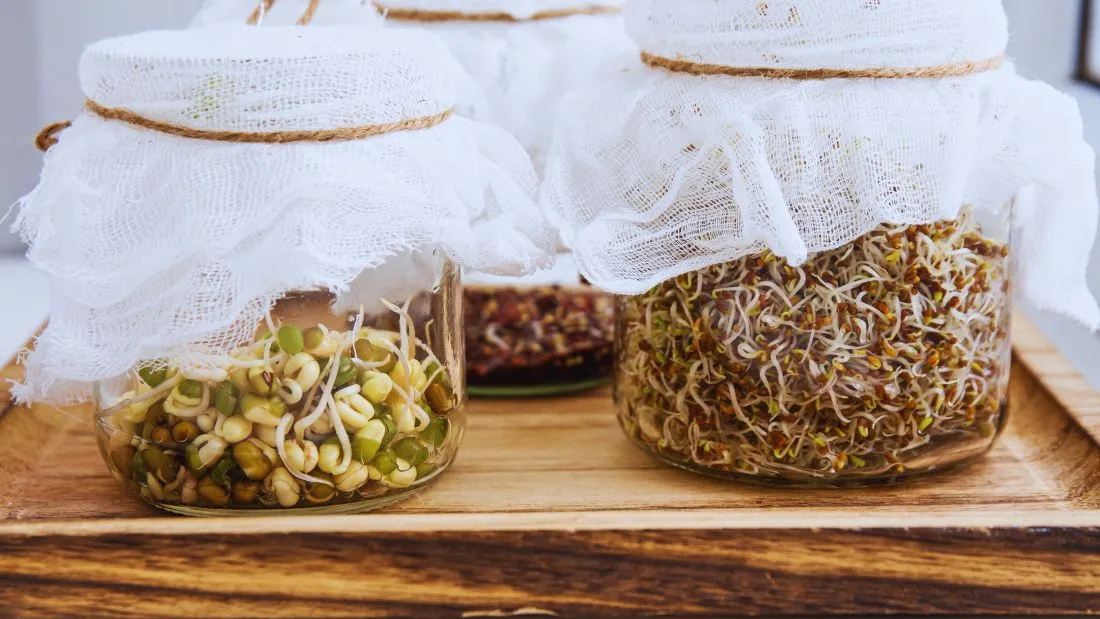A guide to sprouting

What to sprout, how to sprout and how healthy is it?
Whole grains, pulses and seeds are among the healthiest foods we can eat. Packed with nutrients, they play an important role in preventing obesity, diabetes, heart disease and cancer. They are usually cooked before we eat them but sprouting them instead can turbo-boost their nutritional value.
Sprouts are simply seeds that have germinated and are on their way to becoming baby plants and you can grow them easily and cheaply on your kitchen worktop. Most grains, pulses and seeds can be sprouted and popular varieties include oats, wheat, barley, lentils, mung beans, adzuki beans, chickpeas, alfalfa, sunflower seeds and broccoli seeds – to mention but a few!
During the sprouting process, germination induces enzymes that break down carbohydrates, fats and proteins into simple compounds that are easier to absorb. Sprouting also activates enzymes that reduce levels of substances that block nutrient absorption from plant foods. For example, sprouting initiates enzymes that break down phytates that would otherwise bind with minerals such as zinc, iron and magnesium and reduce their absorption. In other words, sprouting turns a dormant seed into a nutritional powerhouse!
The sprouting process generally increases the availability of nutrients, making sprouts richer in protein, folate, magnesium, phosphorus, manganese and vitamins C and K. For example, one cup of sprouted lentils provides seven grams of protein, 17 to 30 per cent of your daily needs for iron, some B vitamins (except B12), vitamin C and folate but just 80 calories and no cholesterol.
Sprouts are a great sources of antioxidants and other beneficial plant compounds and also tend to contain higher levels of fibre too, which can help ease digestion and combat constipation. An increase in fibre is also important because it slows down glucose release from food which can be beneficial for people with diabetes. There is even some evidence that eating sprouts regularly may help reduce ‘bad’ LDL cholesterol levels in the blood while increasing ‘good’ HDL cholesterol and this may help lower the risk of heart disease and stroke.
Sprouts have a slightly sweet taste and may well appeal to people who struggle to eat vegetables. The Government recommends five portions of fruit and vegetables a day but in the UK, only one in three adults and, shockingly, one in eight children get their 5-a-day. Sprouts could be a way we can get more healthy veg in our diet!
Sprouts can be used in salads, wraps, sandwiches, stir-fries soups, pad Thai and other dishes. Sprinkle a handful on pasta dishes or rice-based meals such as paella or risotto.
How to sprout
Sprouting is easy and can be done at home with very little effort, using simple ingredients and no special equipment, just a bowl, a sieve or colander, a jar, a piece of cheesecloth, a rubber band and your seeds of choice.
- Choose the type of grain, pulse or seed you want to sprout.
- Usually, the package will tell you how much to use – remember the seeds will need space to grow.
- Rinse them thoroughly to remove any dirt, place them in a clean bowl and cover with fresh water. As a rule of thumb, use two to three times as much water as seeds.
- Leave them to soak. Most seeds will be ready after a few hours or overnight. Larger ones, such as chickpeas, may need longer. See the instructions for the specific seeds you are sprouting.
- After soaking, drain the seeds, rinse thoroughly and shake off excess water before transferring them to a clean jar – don’t leave them sitting in a puddle.
- Cover the jar with cheesecloth and secure with a rubber band. You can buy jars with special sprouting lids but it’s not essential.
- Place the jar in a safe, well-lit place but out of direct sunlight. Two or three times a day, rinse and drain your seeds to keep them moist and prevent drying out. Sprouts should start emerging from one to four days.
- Continue rinsing and draining until they are ready to eat – usually two to seven days when two to five centimetres long.
- Once ready, you can store dry sprouts in the fridge for up to five days.
There you have it, for very little money, you can grow your own super-powered veggies in the comfort of your own home!
A word of warning
Because sprouts are usually consumed raw or only lightly cooked, there is a concern that they may increase the risk of food poisoning. To reduce this risk, wash your hands and all the equipment you use thoroughly and make sure to use clean water. If you notice any signs of mould or an unpleasant smell, discard your sprouts and start again. Young children, older adults, pregnant women and anyone with a weakened immune system are advised to avoid eating sprouts.
Some sprouts such as mung bean and alfalfa are high in vitamin K, which plays an important role in healthy blood clotting. However, if you take blood thinning medication, avoid eating too many of these as vitamin K can interfere with its efficacy. There is also some evidence that alfalfa may cause the immune system to become more active, which could increase the symptoms of autoimmune diseases such as lupus. Therefore, those who have autoimmune disorders are advised to avoid alfalfa.




